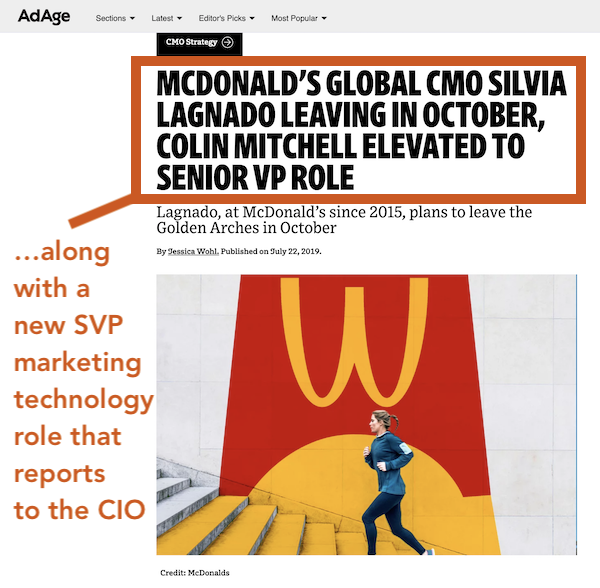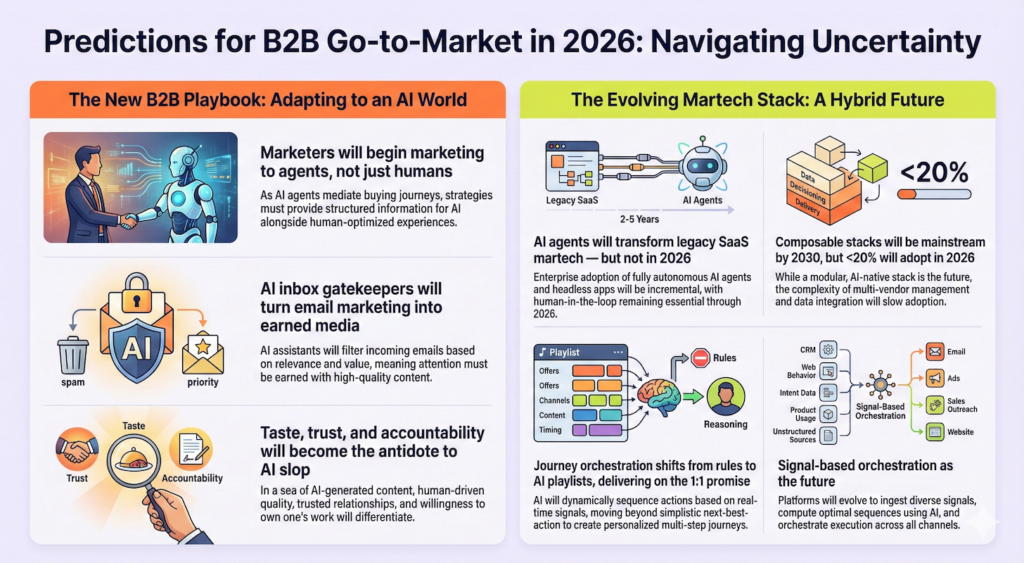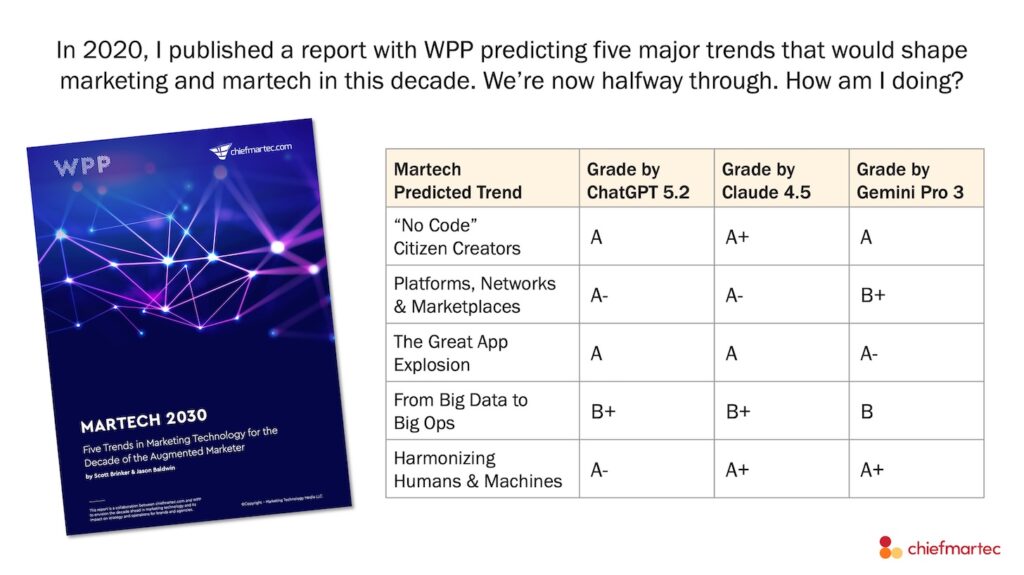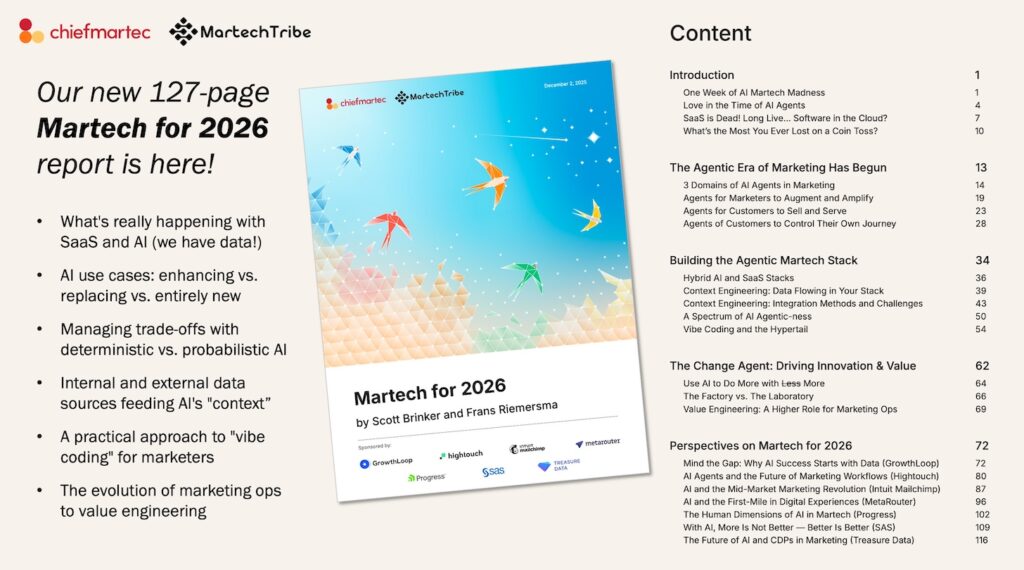Normally, I don’t write about career moves on this blog. But an article that appeared in Ad Age this week about the upcoming departure of famed McDonald’s CMO Silvia Lagnado — and the company’s decision to not name a new CMO — caught my attention.
Another CMO role disappearing is newsworthy — that’s been emerging as a trend lately.
But what really caught my attention was how they’re filling the gap: they’re promoting two VPs who worked for Lagnado to new SVP roles. Colin Mitchell, who was global brand VP, will now be SVP global marketing. And Bob Rupczynski, who was VP global digital engagement, will now be SVP marketing technology. Citing from Ad Age:
And Rupczynski will now report to the company’s CIO, Daniel Henry.
At least by title (senior VP), this puts the head of marketing technology at the same level as the head of global marketing. And at least by reporting structure, it makes it an IT leadership role more than a marketing one.
Fascinating, eh?
This follows the fascinating news earlier this year that McDonald’s acquired Dynamic Yield, a personalization marketing technology company. I joked at our spring MarTech conference that McDonald’s was now actually a martech company.
What does this all mean? While it’s questionable to extrapolate a global pattern from a single (albeit fascinating) instance, I think this does give us another significant point on the curve that martech is increasingly a core competency at leading companies. Even though this role reports to the CIO, I think we’re justified in declaring that martech is marketing (not the entirety of marketing, of course, but a major component of its operations and strategy).
I can’t help but recall the Ad Age editorial from just three years ago that “martech is so boring” — and my spirited rebuttal. Now that the magazine is reporting a CMO going away and a new SVP marketing technology being promoted at one of the most iconic brands in the world, I’d humbly suggest that martech turned out to be pretty interesting after all.
And in the grand scheme of things, it’s just getting started.
P.S. Fascinated by the growing influence and impact of marketing technology? Come join us at the upcoming MarTech conference in Boston, September 16-18.







This is indeed a fascinating development Scott. We created an infographic last year to illustrate what we saw at the time as the “The changing face of the Today’s CMO” and how a different skillset is required (https://www.crmtechnologies.com/insights/changing-face-todays-cmo). Maybe companies are starting to recognise that the traditional career path of the CMO is not where these skills are learnt?
Great post – the debate goes on. There seems to be a labeling issue on one side and a more fundamental question in the Mc Donald’s story on the other.
The Schultz article you quote, stresses the trend and need for greater accountability and focus of Marketing along traditional commercial domains such as brand, customers, experience and growth. The word technology is not mentioned at all in his article, hence my inclination to refer to it as a labeling issue and call for greater focus along traditional Marketing/Sales activities.
McDonald’s decision looks more fundamental (the CIO/CFO empires striking back?) as Marketing Technology roles are being shifted to the CIO. McDonald’s is well known for its obsessive fixation on cost control. It seems they may be rethinking Marketing’s role in technology decisions, management and the need for better integration with other parts of the organization, and probably felt Marketing was not the best at meeting these broader objectives.
Excellent news. I will continue to follow this issue. McDonalds is a very important brand.
The emergence of the social platforms – and the attendant data-analytics skillset that is required – has driven the traditional CMO into the corporate graveyard. Indeed there is a technology skillset now required that was unnecessary yesterday. MCD is merely reflecting a marketplace reality. The macro-transition will ride on the MARRIAGE of this new skillset with the “connective tissue” of the people/creative segment. The “math + art” concept captures this evolution perfectly. Marketing is changing.
And companies that aren’t LEADING with “non-push” content will lose. The key is how well that connects via analytics feedback over the various platforms.
Business is like sports in that “old and slow” loses to “young and flexible.” BUT…unlike sports, businesses can prevent themselves from becoming old and slow.
We are about to see who actually does….